Peter Bergen
CNN — The war in Ukraine is at a stalemate, but that doesn’t mean it’s not changing. General David Petraeus predicts the war will look different this year with significant offensives likely staged by the two sides. Overall, the war continues to demonstrate basic weaknesses in Russia’s military, which was once thought to be one of the most capable in the world.
Petraeus has spent decades studying warfare and practicing its application. He was the US and coalition commander of the wars in Afghanistan and Iraq and later served as director of the CIA. He earned his Ph.D. from Princeton with a dissertation on the Vietnam War and the lessons the American military took from it. Petraeus is also the co-author, with British historian Andrew Roberts, of the forthcoming book, “Conflict: The Evolution of Warfare from 1945 to Ukraine.”
As we approach the first anniversary of the Russian invasion of Ukraine on February 24, I asked Petraeus to reflect on the larger lessons of the war.
He says the Russians have lost many battles because of multiple failures of their military culture, doctrine, organizational structures, training and equipping. While Petraeus says this is in many ways the first open-source war, other aspects are being fought with Cold War tactics and weapons – albeit with upgraded capabilities, drones and precision munitions.
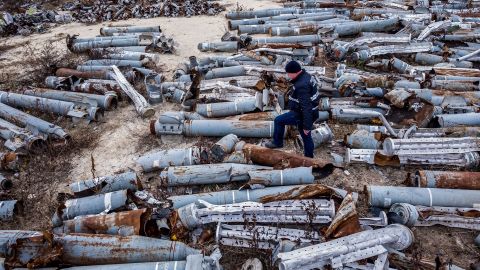
An expert from the prosecutor's office examines collected remnants of shells and missiles used by the Russian army to attack the second largest Ukrainian city of Kharkiv, on December 7, 2022.Aleksey Filipov/AFP/Getty Images
Petraeus, who criticized the Biden administration’s withdrawal of Afghanistan, strikes a different tone on Ukraine. He says the President’s team has done a very impressive job of leading NATO and the West to counter the Russian invasion, though there have been times he would have liked to have seen decisions to provide certain weapons systems (such as western tanks and longer-range precision munitions) made sooner than they were.
The enormous US and western support of Ukraine means, Petraeus observes, that while the Russians may be preparing to send hundreds of thousands of soldiers into Ukraine in a new offensive, they will face off in the coming months with better-trained and better-organized Ukrainian soldiers armed with American longer-range missiles, armored vehicles and a tremendous amount of ammunition. And Petraeus says his money is still on the Ukrainians.
Meanwhile, as Petraeus notes, though Russian President Vladimir Putin set out to Make Russia Great Again with his invasion of Ukraine, he has, instead, achieved exactly that with the NATO alliance.
We conducted the interview over email.
Bergen: Who’s winning the war?
Petraeus: It is not Russia. Russia has, after all, lost the Battles of Kyiv, Sumy, Chernihiv, and Kharkiv; failed to take the rest of Ukraine’s southern coast (not even getting through Mykolaiv, much less to the major port at Odesa).
It has lost what it had gained in Kharkiv province. And it has had to withdraw its only forces west of the Dnipro River in Kherson province because the Ukrainians made the vital bridge connections to those forces impassable, took out the headquarters and logistics sites supporting those forces, and isolated them from the rest of the Russian elements east of the river.
That said, the battle lines since the withdrawal of the forces west of the Dnipro last fall have been fairly static, although Russian forces have made grinding, incremental and very costly gains in villages around Bakhmut in southeast Ukraine. And the Ukrainians are having to commit additional forces to defend the areas under pressure.
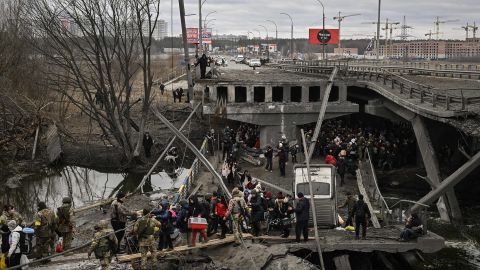
Residents cross a destroyed bridge as they evacuate the city of Irpin, northwest of Kyiv, during heavy shelling and bombing on March 5, 2022.Aris Messinis/AFP/Getty Images
So, the situation is essentially a stalemate at present, albeit with Russia making costly attacks in several areas, and with both sides building up forces for offensive operations expected in the late winter (likely the Russians) and spring/summer (the Ukrainians).
The side that generates the most capable, well-trained and well-equipped forces by then will make the most significant gains. And my bet is on Ukraine in that regard.
Bergen: What are the lessons of the Ukraine War for the future of warfare?
Petraeus: I think we should recognize that, with a few exceptions, Ukraine is not the future of warfare. In large measure, it is what we would have seen had the Cold War turned hot in the mid-1980s – with largely Cold War weapons systems (albeit with some modernization).
We are, however, seeing some glimpses and hints of what the future of warfare might look like. We see the Ukrainian use of drones (of only modest range and capability) as aerial observers identifying Russian headquarters and other targets for the precision munitions the US has provided (which will double in range from 70-80 kilometers to 150 kilometers when the just announced US precision munitions arrive in Ukraine).
We see the impact of sophisticated, western-provided fire-and-forget shoulder-launched anti-tank and anti-aircraft missiles. We have seen the impact of select use of medium-range anti-ship missiles. And we have seen use of offensive cyber capabilities, though not with enormous success, by the Russians.
Perhaps most notably, of course, we see a war taking place, for the first time, in a context that includes the widespread presence of smart phones, internet connectivity, and social media and other internet sites.
But, again, these are just hints of what the future of war between advanced powers would be. In such a conflict, the intelligence, surveillance and reconnaissance systems would be incomparably more capable; precision munitions would have vastly greater range, speed and explosive power.
And there would incomparably greater numbers of vastly more capable unmanned systems (some remotely piloted, others operating according to algorithms) in every domain – not just in the air, but also at sea, sub-sea, on the ground, in outer space, and in cyberspace, and operating in swarms, not just individually!
And every intelligence and strike capability will be integrated and connected by advanced command, control, communications and computer systems.
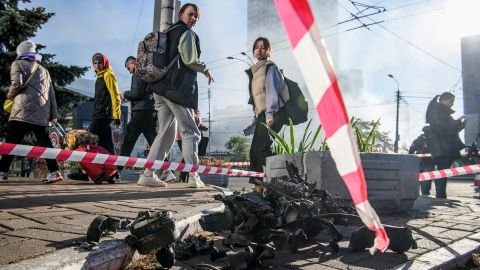
Kyiv residents look at parts of an unmanned aerial vehicle (UAV), which Ukrainian authorities consider to be an Iranian-made drone Shahed-136, after a Russian drone strike on October 17, 2022.Vladyslav Musiienko/Reuters
I recall an adage back in the Cold War days that stated, “If it can be seen, it can be hit; if it can be hit, it can be killed.” In truth, we didn’t have the surveillance assets, precision munitions and other capabilities needed to truly “operationalize” that adage in those days. In the future, however, just about everything – certainly every platform, base and headquarters – will be seen and thus be susceptible to being hit and destroyed (unless there are substantial defenses and hardening of those assets).
Imagining all this underscores, of course, that we must take innumerable actions to transform our forces and systems. We must deter future conflict by ensuring that there are no questions about our capabilities or our willingness to employ them – and also by doing everything possible to ensure that competition among great powers does not turn into conflict among them.
Bergen: Several years back, some people were calling NATO obsolete. Is it?
Petraeus: This question gets at one of the ironies of the situation. Putin set out to “Make Russia Great Again.” However, what he has done is make NATO great again – with two very capable, historically neutral powers (Finland and Sweden) seeking NATO membership; with substantially increased defense spending by NATO members, most notably Germany; with augmentation of NATO forces in the Baltic states and eastern Europe; and with the greatest unity among NATO members since the end of the Cold War.
Thanks to Putin, the description of NATO as suffering from “brain death” by French President Macron in late 2019 has turned out to be more than a bit premature.
Bergen: Is the Russian military’s performance in Ukraine surprising to you?
Petraeus: Not completely. In an interview with The Atlantic published shortly before the Russian invasion, I explained the considerable difficulties I expected Russia would encounter and noted that an invasion force of some 190,000 was much less than what likely would be required, especially if the Ukrainians proved to be as determined as I thought they would be (and they have been even more so).
Beyond that, though, even I didn’t foresee how miserably the Russians would perform.
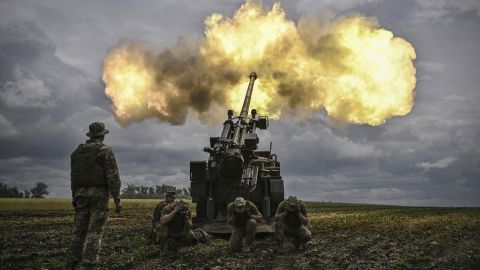
Ukrainian servicemen fire with a French self-propelled 155 mm/52-calibre gun in the eastern Ukrainian region of Donbas on June 15, 2022.Aris Messinis/AFP/Getty Images
Bergen: Is Russia failing because of failures of intelligence? Failures of its conscripts? Failures of Russian military culture? All the above?
Petraeus: All of the above and more. The list is long, including poor campaign design; wholly inadequate training (what were they doing for all those months they were deployed on the northern, eastern, and southern borders of Ukraine?); poor command, control, and communications; inadequate discipline (and a culture that condones war crimes and abuse of local populations); poor equipment (exemplified by turrets blowing off of tanks when fires ignite in them); insufficient logistic capabilities; inability to achieve combined arms effects (to employ all ground and air capabilities effectively together); inadequate organizational architecture; lack of a professional noncommissioned officer corps; a top-down command system that does not promote initiative at lower levels and pervasive corruption that undermines every aspect of their military – and the supporting military-industrial complex.
Bergen: So, do we not have to worry about Russia as a “great power” anymore?
Petraeus: Not at all. Russia still has enormous military capacity and is certainly still a nuclear superpower, as well as a country with enormous energy, mineral and agricultural blessings. It also has a population (about 145 million) that is nearly double that of the next largest European countries (Germany and Turkey, each just more than 80 million).
And it is still led by a kleptocratic dictator who embraces innumerable grievances and extreme revanchist views that severely undermine his decision-making.
Bergen: You know the observation sometimes attributed to Stalin: “Quantity has a quality all its own.” Russia has a far bigger population than Ukraine: Will that make a critical difference to the Ukraine war over the long term?
Petraeus: It could if Putin mobilized all of Russia successfully. However, to date, the mobilizations have been partial, as Putin seems to fear how the country might respond to total mobilization. In fact, reportedly, more Russian men left the country than reported to the mobilization stations in response to the latest partial call-up of reserves.
Nonetheless, it is estimated that as many as 300,000 new recruits and mobilized reservists are being sent to the frontlines, with up to 100,000-150,000 more on the way. And that is not trivial – because quantity does, indeed, matter.
Bergen: But is Napoleon correct in this case: “In war, the moral is to the physical as three is to one” – and Ukrainian morale seems to be higher.
Petraeus: That is a huge factor. Ukrainians sees the ongoing conflict as their War of Independence, and they have responded accordingly. President Volodomyr Zelensky has been positively Churchillian in rallying all Ukrainians to the service of their country as it fights for its national survival.
Thus, Ukrainians know what they are fighting for, while it is not clear that the same is true of many of the Russian soldiers, a disproportionate number of whom are from ethnic and sectarian minorities in the Russian Federation.
Moreover, Ukraine has, to date, done a better job than Russia of recruiting, training, equipping, organizing and employing additional forces – enabled by the extraordinary support provided by the US (more than $26 billion in arms, ammunition, and other security assistance since the beginning of the latest invasion) and other NATO and western countries. And I think we will see further evidence of this when Ukraine launches its counter-offensive in the spring or summer.
Bergen: What technologies have proven key to Ukrainian successes in this war? Several newish technologies seem to have proven important: Elon Musk’s Starlink mobile satellite systems kept communications open for the Ukrainians after the Russians had partially destroyed the phone system and jammed it. US-supplied HIMARS precision rockets have decimated Russian targets. Clearview AI, a controversial facial recognition technology used by some US police departments, has enabled the Ukrainians to identify Russian soldiers on the battlefield. TB2 Turkish armed drones have proven devastating to Russian targets and cheap commercial drones have helped the Ukrainians find targets.
Petraeus: All of those technologies have proven very important, and the Ukrainians have demonstrated enormous skill in adapting various technologies and commercial applications to enable intelligence gathering, targeting and other military tasks.
In fact, the Ukrainians have also shown exceptional abilities to “McGyver” solutions for a variety of problems – whether adapting Western missiles for use on MiG-29 fighter aircraft, repairing battle-damaged armored vehicles left on the battlefield by the Russians (remember the Ukrainians’ “tractor army”), or jamming Russian communications.
And the Ukrainians also have demonstrated a very impressive ability to learn how to employ new weapons systems and vehicles much more rapidly than anyone anticipated, as they want to master new capabilities as quickly as is possible and get back to the fight.
Bergen: How would you grade the Biden administration’s approach to the Ukraine war?
Petraeus: I think the Biden Administration has led NATO and the rest of the western world very impressively in responding to the Russian invasion – providing enormous quantities of arms, ammunition, and other material and economic assistance. And also guiding the effort to impose economic, financial and personal sanctions and export controls on Russia. (And I offer this, noting that I am not a member of a political party and was very critical of the decision to withdraw from Afghanistan and the way the withdrawal was conducted.)
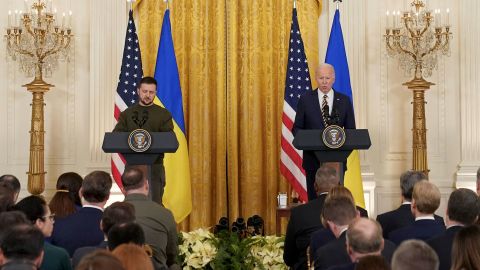
Ukrainian President Volodymyr Zelensky and US President Joe Biden during a joint news conference in the East Room of the White House in Washington, on December 21, 2022.Kevin Lamarque/Reuters
To be sure, there have been times when I have felt that we should have decided to provide various capabilities (e.g., HIMARS, longer-range precision munitions, tanks, etc.) sooner than we have.
However, having sat around the Situation Room table in the West Wing of the White House, I know that it is far easier to second-guess from the outside than it is to make tough calls in office. But there are some additional capabilities (advanced drones, even longer-range precision munitions, fighter aircraft, and additional air defense and counter-drone capabilities) that I would like to see us provide sooner rather than later.
Eventually, for example, Ukraine is going to have to transition from eastern bloc aircraft (e.g., MiG-29s) to western ones (e.g., F-16s). There just aren’t any more MiGs to provide to them, and they reportedly have more pilots than aircraft at this point.
So, we might as well begin the process of transition, noting that it will take a number of months, regardless, to train pilots and maintenance personnel. All that said, again, I think the Administration has done a very impressive job and proven to be the indispensable nation in this particular situation – with important ramifications for other situations around the world.
Bergen: How would you grade Putin in this campaign? Has he got anything right?
Petraeus: Putin has earned a failing grade to date. Let’s recall that the first and most important task of a strategic leader is to “get the big ideas right” – that is, to get the overall strategy and fundamental decisions right. Putin clearly has failed abysmally in that task, resulting in a war that has made him and his country a pariah, set back the Russian economy by a decade or more (losing many of Russia’s best and brightest, and prompting over 1,200 western companies to leave Russia or reduce operations there), done catastrophic damage to the Russian military and its reputation and put his legacy in serious jeopardy.
That said, we should not underestimate Putin. He still believes that Russia can “out-suffer” the Ukrainians, Europeans, and Americans in the same way that Russians out-suffered Napoleon’s army and Hitler’s Nazis. And the US and our NATO and western allies and partners need to do all that we can, as quickly as we can, to enable Ukraine and prove Putin wrong.
Putin still believes that Russia can ‘out-suffer’ the Ukrainians, Europeans, and Americans in the same way that Russians out-suffered Napoleon’s army and Hitler’s Nazis.
Gen. David Petraeus
Bergen: The quasi-private Wagner Group is the force that Putin sends into the meat grinder of the toughest battles. Any thoughts on using mercenaries, many of whom are convicts, as a tactic?
Petraeus: What Russia has done with what are, in essence, mercenaries, as you note, is somewhat innovative – but also essentially inhumane, as it entails throwing soldiers (many of them former convicts) into battle as cannon fodder, and with little, if any, concern for their survival.
These are not the tactics or practices that, at the end of the day, foster development of well-trained, disciplined, capable, and cohesive units that have trust in their leaders and soldiers on their left and right.
Bergen: What are the lessons of Ukraine for the Chinese if they were to stage an invasion of Taiwan, which would not be over a neighboring land border but over a 100-mile body of water? Does the sinking of the Moskva, the flagship of Russia’s Black Sea navy, reshape how the Chinese might think about this question?
Petraeus: As a general observation, I think the developments in Ukraine have to be a cautionary tale for any country around the world contemplating a very challenging military operation – especially if that country’s forces have not engaged in major (or any) combat operations in many decades.
And especially if the target of such an operation has a population willing to fight fiercely for its survival and be supported by major powers – not just militarily but with substantial economic, financial, and personal sanctions and export controls.
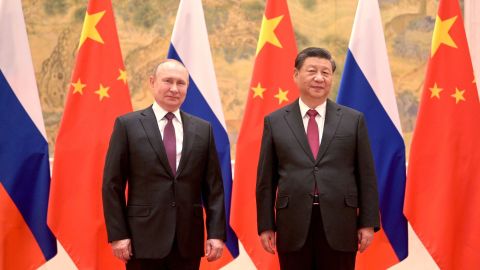
Russian President Vladimir Putin and Chinese President Xi Jinping meet in Beijing on February 4, 2022, just weeks before the invasion of Ukraine.Kremlin Press Office/Anadolu Agency/Getty Images
Bergen: Putin has hinted at using tactical nuclear weapons in Ukraine: Is that plausible? What would/should the US response be were that to happen?
Petraeus: It is certainly possible that Putin could order Russian use of tactical nuclear weapons in Ukraine, Peter, and we should be concerned about that possibility. However, that would be an incredibly bad decision on his part, as use of such weapons would result in Russia being in a worse situation than it was before their use, rather than a better situation.
And it is critical that the leaders of the US and other western nations – and of China and India, as well – convey clearly and repeatedly to Putin that the consequences of the use of nuclear weapons for Russia would, indeed, be “catastrophic,” to quote US National Security Advisor Jake Sullivan.
Bergen: Is this the first truly open-source war? The war in Ukraine is being fought in part on social media by Zelensky; commercial overhead satellites capture Russian battle groups moving around in real-time, and the social media accounts of Russian mercenaries in the Wagner Group document what they are doing.
Petraeus: Yes, I believe it is. This is the first war in which smartphones and social media have been so widely available and also so widely employed. The result is unprecedented transparency and an extraordinary amount of information available – all through so-called “open sources.”
Bergen: What does Putin want?
Petraeus: In the long term, Putin still wants to deny Ukraine its sovereignty and make it part of the Russian Federation. In Putin’s grievance-filled, revisionist version of history, Ukraine does not have a right to exist as an independent country.
That said, in the short term, having failed to take control of Kyiv and replace President Zelensky with a pro-Russian figure, Putin is seeking to expand the area of Ukraine controlled by Russian forces. Particularly in the southeastern part of Russia, and to solidify Russian control over the provinces that connect Russia with Crimea in the so-called land bridge, so that Russia does not have to rely solely on the Kerch Strait Bridge for connection with Crimea.
Bergen: Does Putin have a plan? Or is he just improvising?
Petraeus: Well, Putin recently made General Valery Gerasimov, chief of the general staff, the commander of the war in Ukraine, presumably to ensure that the Russian Military and Ministry of Defense are doing all that they can to generate additional forces for the battlefield in Ukraine. And Russia has been seeking additional arms, ammunition, and weapons systems from other countries – such as Iran and North Korea – to make up for the shortfalls in production of Russia’s military industries that are constrained by export controls.
Beyond that, it appears that Russia is massing replacement soldiers and additional units to launch an offensive to take the portions of Donetsk and Luhansk provinces in the southeast, that they do not control – while also establishing defensive positions in depth in other areas that they control in the south.
That said, there does not seem to be a particularly innovative new plan, given the limitations of the professional capabilities of the Russian forces and their demonstrated inability to generate “combined arms effect” – to integrate the actions of tanks with infantry, artillery/mortars, engineers, explosive ordnance disposal, electronic warfare, fixed and rotary wing close air support, air defenses, effective command and control, drones, etc.
In the absence of that, we will likely see more of what we have seen in the past – Russian commanders throwing recently mobilized, inadequately trained, and poorly equipped soldiers into tough fights. And supported by massive artillery and rocket fires (assuming they can maintain the supply of artillery rounds and rockets), to achieve grinding, costly, incremental gains – with, perhaps, an occasional limited breakthrough.
And all of this will be happening while we await the Ukrainian offensive that will be launched in the spring or summer, with much better trained, better equipped and more capable Ukrainian forces.
Bergen: How will the next stage of the war be different from the first year?
Petraeus: There will be several new features this year, most significantly the additional capabilities on the Ukrainian side: Western tanks and infantry fighting vehicles; longer-range and larger precision munitions for the US-provided HIMARS (high mobility artillery rocket systems) that will enable precise strikes out to 150 kilometers (twice the range of the current precision munition); additional air defense systems of various types; augmented air defenses and additional wheeled armored vehicles, as well as enormous quantities of additional ammunition of all types.
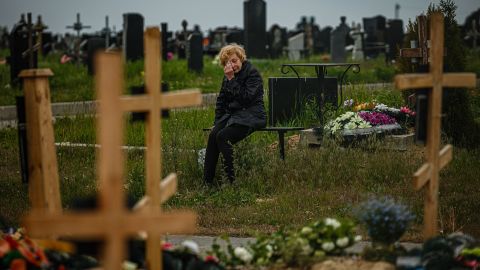
A woman visits the grave of a Ukrainian serviceman, in the military section of a Kharkiv cemetery, May 21, 2022.Dimitar Dilkoff/AFP/Getty Images
Beyond that, I believe we will see Ukrainian forces that are much more capable than the Russians at achieving the kind of combined arms effects that I described earlier and that thus enable much more effective offensive operations and can unhinge some of the Russian defenses. We may not see all this, however, until the spring or even summer, given the amount of time required for Ukrainian forces to receive and train on the new western tanks and other systems.
Meanwhile, in addition to the Russian offensive I mentioned earlier, I fear we will also see additional Russian attacks on Ukrainian infrastructure with Russian missiles and rockets, as well as with Iranian-provided drones – which underscores the importance of doing all that we can to further constrain the Russian arms industries and also those of Iran.
Bergen: In 2003, at the beginning of the Iraq War, you famously asked a rhetorical question: “Tell me how this ends?” For the war in Ukraine: How does this end?
Petraeus: I think it ends in a negotiated resolution, when Putin recognizes that the war is unsustainable on both the battlefield (where Russia has in the first year likely taken many times the losses that the USSR took in nearly a decade in Afghanistan) and on the home front (which has been heavily impacted by economic, financial, economic, and personal sanctions and export controls).
Also when Ukraine reaches the limits of its ability to withstand missile and drone strikes, getting a Marshall-like plan (developed by the US and G7) to help rebuild the country, and gaining an ironclad security guarantee (either NATO membership or, if that is not possible, a US-led coalition guarantee).
A security guarantee will be critical to enabling the success of the reconstruction effort and attracting outside investment.
No comments:
Post a Comment